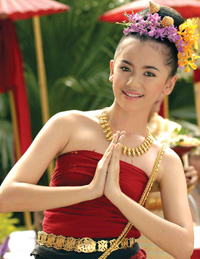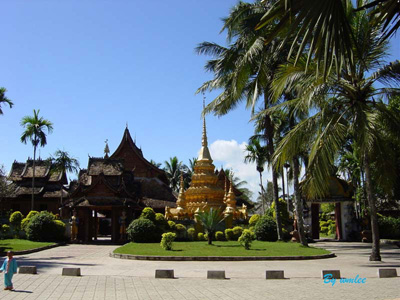| Tools: Save | Print | E-mail | Most Read |
| A Splash of Happiness |
| Adjust font size: |
This year, the International Water-Splashing Festival will be held by the government of Xishuangbanna Dai Autonomous Region from April 12 to 15. Being splashed and blessed during the festival is an experience like none other.
April 13 Fanggaosheng Fanggaosheng is an important event for the Dai people when celebrating their New Year. Gaosheng is a kind of firework made from bamboo and powder. The Dai people fill the bottom of the bamboo with powder and other materials and put it on the bamboo Gaosheng shelf. People usually fire Gaosheng at night. If sealed properly, the detonation of the powder will make a huge explosion, launching the bamboo into the sky like a rocket with white smoke before exploding. The higher the Gaosheng flies, the happier the people feel. People hope the Gaosheng will carry away the diseases and disasters from the earth and bring a good harvest and safety. Duisha (sand-piling) competition Duisha is a traditional Dai activity with its roots in a legend about a widow asking for sons by piling sands and shaping them into children. Not long after, the widow gave birth to three sons who were talented and smart. The three boys went on to fight with cruel and filthy people when they grew up. The Dai people celebrate Duisha wishing for happiness as they pile sands. They regard the competition as a way of communicating with others and strengthening friendships. If you go to see the Dai Water-Splashing Festival, don?ˉt miss the Duisha competition. You can bless your family and friends, and also reeive well-wishes from the Dai people. April 14 Ganbai Ganbai is the biggest and busiest event during the Water-Splashing Festival. In cities, towns and villages, there are various size fairs where Dai people go to buy and sell goods. Each year in the middle of April, you can see Dai people everywhere near the villages and the river banks. Young people gather together, singing, dancing, and selling goods. You can taste traditional Dai food as well, or even sit down watching people firing Gaosheng. April 15 Water-Splashing ceremony At the climax of the festival, everyone is dressed in beautiful clothes and prepares for blessing and receiving wishes from others. Don't be shy - just splash water on everyone no matr whether you know them or not. Don't worry about your clothes being ruined either, the more wet you are, the more blessing you've received from othersToday is the Water-Splashing Festival and the main reason we came to Xishuangbanna. My wife and I got up early in the morning and bought a basin, filling it with water. As soon as we stepped out of the house, someone hit us with a barrel full of water. My wife and I defend ourselves by throwing water back. We were totally soaked even before arriving downtown for the festival. We lost count of how many people splashed us with water and how many people we splashed. It was the coolest day I ever spent. At the grand plaza, government officials were paraded about on litters. Everyone tossed water at them from their basins. My wife joined in and splashed each official. yushan blog--I got off the train in Jinghong, Xishuangbanna Dai Autonomous Region, on the day of the Water-Splashing Festival. Coming out of the railway station, I saw crowds of people gathering in front of different hotels and restaurants, splashing water with small bowls and basins. The festival was still nowhere near its climax. When I arrived at the cultural plaza, I was soaked by water hurled from every direction. I had no idea what had happened. It was interesting and exciting to run through the street of splashing water. I could see some water splashed through windows; some off the tops of buildings; some tossed by people along the street; some splashed from barrels and basins; some shot by toy squirt guns. Some people were even lining up to splash water. Old and young, adults and children, everyone was happy.
What to eat Purple rice in pineapple Purple rice is a typical Dai sticky food. The rice is marinated in water for seven to eight hours, and then stirred with pork stuffing. A pineapple is cut and stripped of its meat, then stuffed with the purple rice and braised. The rice soaks in the pineapple flavor. Sour bamboo shoots with chicken Sour bamboo shoots always have a place on the Dai dinner table. The shoots are first cleaned and then boiled. When the bamboo shoot is done, put the chicken is put into the soup and boiled. Next, the bamboo shoots and chicken are fried together with peppers, ginger and shallots. Fried lichen The dish is made of dried lichen slices drawn from the river. The lichen are boiled with ginger and salt and dried in sunshine, then cut and fried in hot oil. Fried lichen taste like seafood and is popular among the Dai people.Where to stay Jinghong Hotel (two star) Address: No 16, Galan Zhong Lu, Jinghong Tel: 0691-212 3166 Xinmin Hotel (three star) Address: No 2, Jingde Dong Lu, Jinghong Tel: 0691-2126888 Daiyuan Hotel (four star) Address: No 8, Nonglin Nan Lu, Jinghong Tel: 0691-212 3888 Getting to Xishuangbanna Bus transportation is available from various places to Jinghong bus station: 0691-212 3171, 212 3570 Xishuangbanna bus station: 0691-212 4427 (
|
| Tools: Save | Print | E-mail | Most Read |
 |
| Related Stories |
|
Product Directory China Search |
Country Search Hot Buys |

